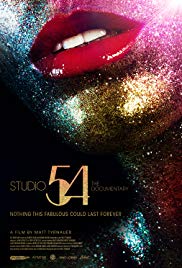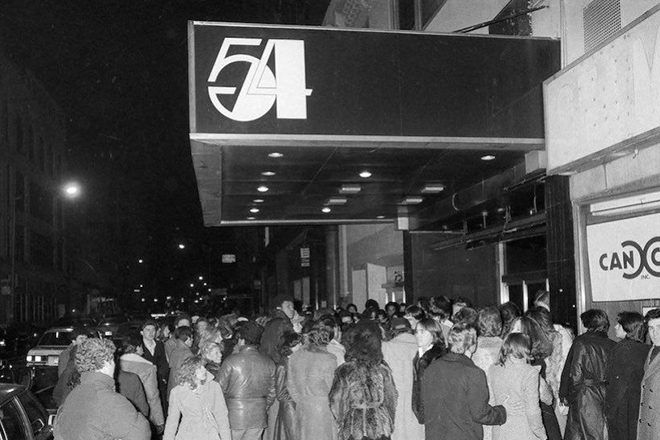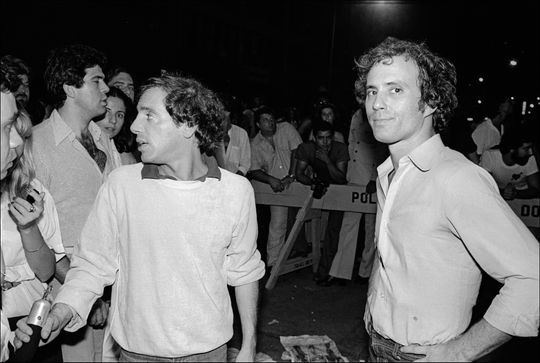By Glenn Dunks
 The most famous nightclub of the 20th century ran for only 33 months, but has gifted us with decades worth of memories. Studio 54, inarguably the pinnacle of 1970s disco decadence was a home for reckless hedonistic abandon and affected sexual liberation all under the appropriately throbbing beat of Donna Summer, Sylvester and Thelma Houston. A celebrity haunt and a genuine phenomenon with girls in fur coats and boys in short shorts and Cadillacs circling the block, it was the place to be even if you couldn't get in.
The most famous nightclub of the 20th century ran for only 33 months, but has gifted us with decades worth of memories. Studio 54, inarguably the pinnacle of 1970s disco decadence was a home for reckless hedonistic abandon and affected sexual liberation all under the appropriately throbbing beat of Donna Summer, Sylvester and Thelma Houston. A celebrity haunt and a genuine phenomenon with girls in fur coats and boys in short shorts and Cadillacs circling the block, it was the place to be even if you couldn't get in.
Studio 54 has played a good sized role in movies, too, so it’s surprising that it’s taken this long to get a comprehensive documentary about it. There have been movies like 54 (recommended in Director’s Cut format and nothing else) and others like Summer of Sam set against Studio’s influential disco beat. And, of course, any documentary about the 1970s, especially as it relates to celebrity or queer life, will inevitably take a limousine detour down W 54th Street in Manhattan. Is Matt Tyrnauer’s film worth the 40-year wait? For the most part, yes; although it can’t but feel like there is still much more that was left on the dancefloor...

The film’s first minor miracle is that it’s able to reveal anything new at all, elements of its history that aren’t as widely written about or memorialised by the usual sources. Too often parts of Studio 54's story gets lost in the schadenfreude around its demise amid the disco backlash of the 1980s and the club’s owners’ jailing for tax evasion.
Much of the new revelation is thanks to securing a rare interview with Ian Schrager, the backstage figure to Steve Rubell’s extraverted face of the venue (Rubell died in 1989). The pair, inseparable entrepreneurs for years before and even after Studio 54 went out in flames, remain a fascinating duo and Schrager lends Studio a much-needed level-headedness. Studio 54 isn’t all party all the time, which it easily could have been, and there are touching moments thanks to Schrager’s appearance. Schrager is now a successful hotel owner who was recently pardoned due to his efforts post-jail and the suggestion that his crimes were a mere symptom of major success too quickly (that he can go on to be more successful than before and be forgiven for his crimes goes uninvestigated beyond the mere mention of it, here).

Surprisingly, the film is absent of big stars outside of the often delightful archival footage (Liza Minnelli and Michael Jackson feature most prominently). Meanwhile, while it pays minor service to the Studio’s place as a sort of gay mecca where sexuality didn’t matter, it would have been great to see a deeper dive into this particularly among the transgender community (especially when many trans men and women were denied access to more exclusively gay venues for decades afterwards). This was better explored in the similarly-themed Susanne Bartsch: On Top. The infamous balcony is barely touched upon beyond a wink here or a gag there about the seats eventually being covered in plastic to make hosing them down easier. For a venue that prided itself on madcap extravagance, the documentary feels somewhat tame as if deliberately targeted at the discotheque nightclubbers who are now respectful suburbanites.
But those going into Studio 54 for a fun trip down memory lane will still find much to appreciate. The archival footage, both video and still photography, is a gas. The form is unremarkable, but solid, although there is certainly delight to be found in hearing the disco soundtrack up loud. Studio 54 occasionally feels like the abridged version of the real story, but it’s still nonetheless a very entertaining one.
Release: Opens in New York City this weekend through Zeitgeist Films before touring the country through October and November.
Oscar Chances: Not a chance. They've shown no desire to reward documentaries like this for better or worse.